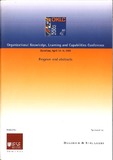| dc.contributor.author | Politis, John D. | |
| dc.date.accessioned | 2016-09-30T07:24:20Z | |
| dc.date.available | 2016-09-30T07:24:20Z | |
| dc.date.issued | 2003 | |
| dc.identifier.uri | http://hdl.handle.net/11728/8811 | |
| dc.description.abstract | Knowledge has been identified as an important resource that contributes to the competitive advantage of an organisation. The problems associated with irresponsible use of power manifest itself in the loss of organisational knowledge and the expensive duplication of knowledge acquisition, rising costs and reduced performance. Although interpersonal skills are most often cited as essential for successful knowledge acquisition, little is known about the affect of the forces of power in the process of knowledge acquisition. A survey of 130 members of self-managing teams who are engaged in knowledge acquisition activities was carried out to investigate the relationship between the dimensions of power associated with French and Ravens' power-based taxonomy, a number of knowledge acquisition attributes, and performance. The findings suggest that most of the bases of power enable followers' knowledge acquisition, but the bases of power and indeed knowledge acquisition are not pre-existing conditions for achieving desirable performance | en_UK |
| dc.language.iso | en | en_UK |
| dc.publisher | Organizational Knowledge Learning and Capabilities Conference, OKLC | en_UK |
| dc.relation.ispartofseries | Organizational Knowledge Learning and Capabilities Conference;program and abstracts, Barcelona, April 13-14, 2003 | |
| dc.rights.uri | http://creativecommons.org/licenses/by-nc-nd/4.0/ | en_UK |
| dc.subject | Research Subject Categories::SOCIAL SCIENCES::Business and economics | en_UK |
| dc.subject | power | en_UK |
| dc.subject | knowledge acquisition | en_UK |
| dc.subject | team performance | en_UK |
| dc.subject | implications | en_UK |
| dc.title | Power and knowledge acquisition: the implications for team performance | en_UK |
| dc.type | Working Paper | en_UK |


